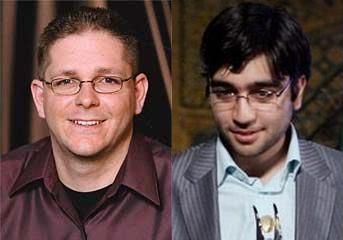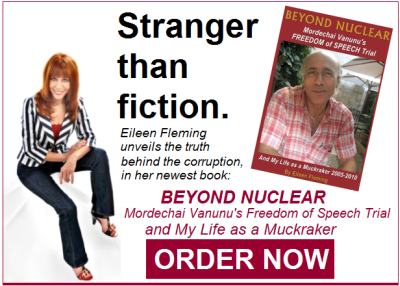
Publisher:
Bonnie King
CONTACT:
Newsroom@Salem-news.com
Advertising:
Adsales@Salem-news.com

~Truth~
~Justice~
~Peace~
TJP
Nov-08-2010 09:41

 TweetFollow @OregonNews
TweetFollow @OregonNews
A Good Science Fiction Book Expands the Mind: Tobias Buckell
Interview by Kourosh Ziabari
 Tobias Buckell and Kourosh Ziabari |
(TEHRAN) - Born in Grenada in the Caribbean, Tobias Buckell is a New York Times Best-Seller science fiction and speculative fiction author. Having lived in Ohio since 1995, Buckell started submitting his writings to magazines and newspapers since he was in high school. He sold his first short story in an early age and continued selling stories to the American magazines since then.
He has published four novels of which the most prominent ones are "Crystal Rain" and "Sly Mongoose". He has also written several short stories including "On The Eve of the Fall of Habesh" which was published in November 2010. Buckell is a professional blogger who writes on different issues concerning science fiction literature. In 2008, he donated his book archive to the department of Rare Books and Special Collections at Northern Illinois University.
Tobias joined me in an exclusive interview and answered my questions on his career as a science fiction author, the characteristics of a successful author and his motivations for working on science fiction literature.
Born in Grenada in the Caribbean, Tobias Buckell is a New York Times Best-Seller science fiction and speculative fiction author. Having lived in Ohio since 1995, Buckell started submitting his writings to magazines and newspapers since he was in high school. He sold his first short story in an early age and continued selling stories to the American magazines since then. He has published four novels of which the most prominent ones are "Crystal Rain" and "Sly Mongoose". He has also written several short stories including "On The Eve of the Fall of Habesh" which was published in November 2010. Buckell is a professional blogger who writes on different issues concerning science fiction literature. In 2008, he donated his book archive to the department of Rare Books and Special Collections at Northern Illinois University.
Tobias joined me in an exclusive interview and answered my questions on his career as a science fiction author, the characteristics of a successful author and his motivations for working on science fiction literature.
Kourosh Ziabari: You started writing and submitting short stories while attending high school. How did this early experience of engagement with literature contribute to your professional career as a science fiction author?
Tobias Buckell: I think it let me break in to print much earlier than most authors. I had a ten year head start. But I also got very dedicated to reading as much as possible, during a period of my life when you have a lot of time. I was reading as many as two books a day for most of my young adult life, which let me absorb a great deal of story and story structure. Again, this allowed me to jump ahead a bit.
KZ: What motivated you to become a science fiction author? What is in science fiction that persuades and inspires you to follow it? How is the feeling of creating a science fiction work?
TB: I love the big ideas that come in science fiction. They're so large scale, it just grabs the imagination. I always feel, after a good science fiction book, that my mind has been expanded somewhat. I always sought that feeling as a reader. Now I try to give that back to my own readers.
KZ: You have been the author of the sixth novel in the Halo book series titled "Halo: The Cole Protocol". A science fiction video game franchise was produced on the basis of this book series. What's the significance of creating video games according to science fiction works? Does it have a special impact on the children and young adults who are supposed to be the main addressees of such games?
TB: The video game came first, and the books were based on it. I was a fan of the video game, so was very flattered when I was asked to write a book based in the universe of the game, as I had many ideas about things I wanted to know more about. Getting a chance to make them up was really cool.
I think the people who read books based on the video games do it because they're getting a guarantee that the books will be fun and exciting, like the videogame. I think a lot of people who were forced to read in school assume books are dull, and they might read books based on a video game because they assume that the people associated with the game won't be boring.
KZ: Having in mind the traditional styles of writing in the past decades when technology hadn't yet penetrated into the lifestyle of authors and writers, what's your estimation of the developments which have taken place in the styles and methods of writing? Can we imagine a world in which the authors and writers put aside the paper and pen completely?
TB: Well, I pretty much rarely use pen and paper. I've always used a computer of some sort, starting with a Brother Word Processor machine when I first started writing stories. So I can imagine this already!
KZ: What's your estimation of the impact of Jules Verne on the modern science fiction? Many critics believe that he ushered in a new approach to science fiction. What's your idea about that?
TB: Verne's focus on the machine, and developing more rigorous 'what if' sort of science fiction has remained with us. Hard science fiction still tries to tell a story that is scientifically plausible, much like Verne did.
KZ: Have you ever been inspired by a specific writer whom you believe has introduced something new and innovative to the world of science fiction? What will be your top five popular science fiction books if you're asked to name them?
TB: I was very inspired by the Cyberpunk writers: Sterling, Gibson, et al, who showed a very blue collar sort of science fiction that was a bit more global than I'd been reading. They inspired me to get writing myself. Some of my favorite books are Merchanter's Luck, by C.J. Cherryh, Islands In The Net by Bruce Sterling, Neuromancer by William Gibson, and A Fire Upon The Deep by Vernor Vinge.
KZ: What are the most essential prerequisites to become a successful science fiction writer? Does a prosperous science fiction author need to have a special expertise?
No special expertise, but certainly having an area of expertise somewhere is important, I believe. That's your foundation to build on.
KZ: In one of your interviews, you alluded to the Isaac Asimov's method for writing. He would work on a project on a typewriter, and then leave it unfinished, switching to another project on another typewriter. Is this a habit of intelligent and genius people to start several works simultaneously and leave all of them unfinished at a same time? What part of this method persuaded you to adopt it during your recovery time?
TB: Lots of smart people have lots of different methods, I believe. I was interested in adopting Asimov's method of writing on multiple projects because I wanted to only work on things when I was excited about them. By having multiple projects around, I could switch to different ones as I got bored and maintain my interest.
KZ: What's your prediction for the future of science fiction? What trends are going to emerge? Which features are going to be added to science fiction? Does the development of technology accelerate the development of science fiction?
TB: Well, at least one trend I think we're seeing is more global voices in science fiction, as the internet has joined us all up. Taking the conversation into a global forum is very exciting.
KZ: Your best-selling novel Crystal Rain has attracted international attention and received wide admiration. Can you tell us a little about the story, its synopsis, the motivation behind writing it and your viewpoint regarding the international appreciation of it?
TB: I call Crystal Rain a far future Caribbean lost colony novel. I play with steampunk and alternate history tropes in it. It's about a colony of Caribbean colonists who've settled a far away world that has been cut off from contact with the rest of the galaxy, and has gotten involved in a centuries old fight between aliens warring over control of the planet.
KZ: For the final question, I want to ask you about the expectations you have of a well-structured, substantiated and interesting science fiction work. Should it be ornamented with too many technical, scientific terms and facts? Should the imaginary aspect prevail over the other parts? What's your viewpoint?
TB: That's such a complicated question. All I ask is for a work to be interesting. That can be anything. Sometimes we use the technical stuff to headily explore the future. But sometimes we can just use the 'furniture' of science fiction to tell a metaphorical tale, and that's okay as well.
=================================================
 The latest writer to join Salem-News.com's team; Kourosh Ziabari is an Iranian media correspondent, freelance journalist and the author of Book 7+1. He is a contributing writer for websites and magazines in the Netherlands, Canada, Italy, Hong Kong, Bulgaria, South Korea, Belgium, Germany, the U.K. and the U.S. He was once a member of Stony Brook University Publications’ editorial team and Media Left magazine’s contributing writer, as well as a contributing writer for Finland’s Award-winning Ovi Magazine. As a young Iranian journalist, he has been interviewed and quoted by several mainstream mediums, including BBC World Service, PBS Media Shift, the Media Line network, Deutsch Financial Times and L.A. Times. Currently, he works for the Foreign Policy Journal as a media correspondent. He is a member of Tlaxcala Translators Network for Linguistic Diversity and World Student Community for Sustainable Development. You can write to Kourosh Ziabari at: kziabari@gmail.com
The latest writer to join Salem-News.com's team; Kourosh Ziabari is an Iranian media correspondent, freelance journalist and the author of Book 7+1. He is a contributing writer for websites and magazines in the Netherlands, Canada, Italy, Hong Kong, Bulgaria, South Korea, Belgium, Germany, the U.K. and the U.S. He was once a member of Stony Brook University Publications’ editorial team and Media Left magazine’s contributing writer, as well as a contributing writer for Finland’s Award-winning Ovi Magazine. As a young Iranian journalist, he has been interviewed and quoted by several mainstream mediums, including BBC World Service, PBS Media Shift, the Media Line network, Deutsch Financial Times and L.A. Times. Currently, he works for the Foreign Policy Journal as a media correspondent. He is a member of Tlaxcala Translators Network for Linguistic Diversity and World Student Community for Sustainable Development. You can write to Kourosh Ziabari at: kziabari@gmail.com
Articles for November 7, 2010 | Articles for November 8, 2010 | Articles for November 9, 2010

Quick Links
DINING
Willamette UniversityGoudy Commons Cafe
Dine on the Queen
Willamette Queen Sternwheeler
MUST SEE SALEM
Oregon Capitol ToursCapitol History Gateway
Willamette River Ride
Willamette Queen Sternwheeler
Historic Home Tours:
Deepwood Museum
The Bush House
Gaiety Hollow Garden
AUCTIONS - APPRAISALS
Auction Masters & AppraisalsCONSTRUCTION SERVICES
Roofing and ContractingSheridan, Ore.
ONLINE SHOPPING
Special Occasion DressesAdvertise with Salem-News
Contact:AdSales@Salem-News.com




Terms of Service | Privacy Policy

All comments and messages are approved by people and self promotional links or unacceptable comments are denied.
[Return to Top]
©2026 Salem-News.com. All opinions expressed in this article are those of the author and do not necessarily reflect those of Salem-News.com.